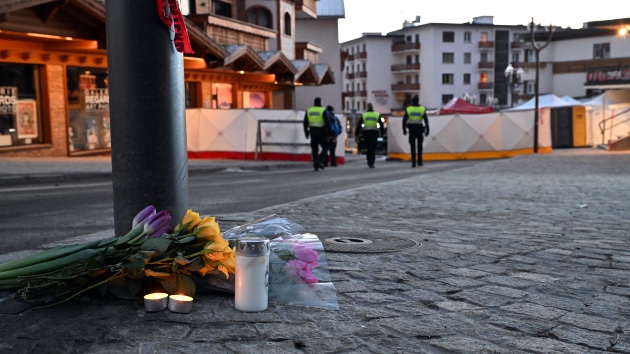Hundreds of truckloads of aid for Gaza stuck as more lives lost to malnutrition, some aid organizations say
Written by ABC Audio All Rights Reserved on March 7, 2024

(TEL AVIV, Israel) — Hundreds of truckloads of aid have been stuck waiting to be distributed in Gaza as the humanitarian crisis worsens amid the ongoing Israel-Hamas war, according to international organizations.
Between 200 and 300 truckloads were at the Kerem Shalom crossing point Tuesday, from Israel into southern Gaza, which have been checked and are waiting to be picked up and distributed, according to Israeli officials from Coordination of Government Activities in the Territories (COGAT).
The distribution of aid in Gaza and getting it to those most in need in the north is one of the most pressing issues, COGAT said. Fifteen trucks carrying food and flour entered the north Wednesday, according to a COGAT post on the social platform X.
However, the United Nations said a higher number of aid trucks need to cross into Gaza daily.
The U.N. Relief and Works Agency for Palestine Refugees in the Near East (UNRWA) previously said Israel doesn’t provide enough authorization to deliver sufficient aid and, even when it does give authorization, the fighting makes it difficult to deliver that aid.
Israel has denied accusations that it isn’t letting enough aid into Gaza, with officials saying the U.N., its partners and other aid agencies have created logistical challenges, resulting in a bottleneck. The U.N. disputes these claims.
Israel has also blamed Hamas for the lack of aid, claiming the group is holding aid for itself and not distributing it to Gazans. Hamas denies the allegations.
After evidence showed some employees of UNRWA allegedly participated in Hamas’ Oct. 7 terror attacks in Israel, the Israeli government has been cutting UNRWA out of the process of distributing aid.
COGAT is now calling on other U.N. agencies such as the World Food Programme (WFP) to step up and replace UNRWA.
“The U.N. needs to increase its capability of distributing the aid so that more aid can reach the different parts of the Gaza strip,” Shimon Freedman, COGAT’s spokesperson, told ABC News.
However, the WFP said the number of food trucks entering Gaza has decreased from an average of 150 trucks per day between January and September 2023, to an average of 59 food trucks per day between Oct. 7, 2023. and Jan. 24 of this year, according to a report last month.
This comes as children in Gaza continue to die from malnutrition with the total believed to be 18 so far, according to Gazan health officials.
The Hamas-run Gaza Ministry of Health announced on Wednesday that a 15-year-old girl died because of malnutrition and dehydration. Earlier this week, a 9-year-old boy named Yazan al-Kafarna died at Abu Youssef Al-Najjar Hospital in Rafah, in the south of Gaza, hospital director Marwan al-Hamas told ABC News.
Yazan had cerebral palsy and needed a customized diet, which was not available due to the fighting in Gaza, al-Hamas said.
Ramesh Rajasingham, director of the U.N. Office for the Coordination of Humanitarian Affairs, said during a briefing last week that one quarter of the population of Gaza — 576,000 people — were “one step away from famine” and one in six children under the age of 2 in northern Gaza is suffering from acute malnutrition.
UNICEF spokesman James Elder told ABC News earlier this week that the number of children in Gaza dying from dehydration and malnutrition “will skyrocket” if there is not a cease-fire.
Heavy fighting has made getting in aid challenging. Last week, more than 110 Gazans were reportedly killed and 750 others injured in Gaza City after crowds converged on an aid convoy, with some of those killed by gunfire, said the Hamas-run Gaza Ministry of Health. The Israel Defense Forces said dozens of people were killed by trampling or run over by trucks, and that soldiers used live ammunition only to deter crowds that put the troops at risk.
Adam Bouloukos, a senior official at UNRWA, told ABC News that a cease-fire is needed in Gaza to ensure aid reaches the areas that are most in need, stating that “you can’t deliver humanitarian aid if you’re being shot at.”
He said the group has struggled to reach the north due to Israel’s ongoing military operations.
Although several countries, including the U.S., have participated in airdrops of aid, Bouloukos described them as “immensely expensive,” “completely inefficient” and “dangerous” and that the only solution to the humanitarian crisis is getting aid in by road.
Since Hamas’ surprise attack on Israel on Oct. 7, more than 30,700 people have been killed in Gaza and more than 72,100 others have been injured, according to the Gaza Ministry of Health.
More than 1,200 people have been killed in Israel since Oct. 7, according to the Israeli Prime Minister’s Office. Israeli officials say 576 IDF soldiers have been killed, including 237 since the ground operations in Gaza began.
ABC News’ Nasser Atta and Helena Skinner contributed to this report.
Copyright © 2024, ABC Audio. All rights reserved.

 KVSP
KVSP 





